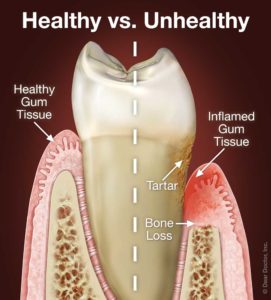Gum Disease
By Alderwood Family Dentistry • March 1, 2019
Happy March Folks!
Dr. Jonas here and I hope everyone has been enjoying all that Winter has to offer but eagerly awaiting Spring. We will be talking about Gum Disease this month.
It’s important to brush your teeth for two minutes twice a day, as well as floss between them at least once a day. Practicing these positive oral health habits can prevent the buildup of plaque between your teeth, which can cause periodontal disease, or gum disease. An estimated 7 out of 10 Canadians have some type of gum disease, according to the Canadian Dental Association. Gum disease can loosen your teeth and even lead to tooth loss.
What is gum disease?
Gum disease is a chronic bacterial infection that affects the gums and bone supporting your teeth. It develops when plaque accumulates along your gumline, causing your gums to become inflamed. Healthy gums appear coral pink and firm and form a sharp point where they meet your tooth. The early stage of gum disease is called gingivitis. In this stage, the gums redden, swell and bleed easily; however, there is usually little to no discomfort with gingivitis. 
What causes gum disease?
Plaque buildup is the primary cause of gum disease. If plaque isn’t removed each day by brushing and flossing, it hardens. The hard plaque, known as tartar, contains bacteria that can irritate gums and break down the fibers that hold the gums tightly to the teeth, creating periodontal pockets that fill with bacteria. This can lead to severe infection, pain and swelling. Your tooth or teeth also may loosen and require removal. Other factors linked to gum disease include smoking and tobacco use, pregnancy, stress clenching or grinding of teeth, an unhealthy diet, diabetes and genetic factors.
Can gum disease affect my overall health?
Yes. People with gum disease may be more likely to develop heart disease or have difficulty controlling their blood sugar, and pregnant women with gum disease are more likely than those with healthy gums to deliver preterm, low birth-weight babies.
How will my dentist treat my gum disease?
In the early stages of gum disease, most treatments involve a special cleaning by your dentist, referred to as scaling and root planing. Scaling involves scraping off the tartar from above and below your gum line. Root planing gets rid of rough spots on your tooth root where germs gather and helps remove bacteria from your mouth. Your dentist also may prescribe special mouthwashes or topical treatments. A laser also can be used to provide fast and minimally invasive gum disease treatment. More advanced cases may require surgical treatment to remove the infected gum tissue or teeth.
How is gum disease prevented?
Removing plaque through daily brushing and flossing
and visiting your dentist twice a year for cleanings are the best ways to minimize your risk of gum disease. You also can lower your risk by maintaining a healthy diet and abstaining from tobacco use.
Brushing: Brush your teeth gently, paying special attention to the areas where your teeth and gums meet. Clean every surface of every tooth. Use the tip of your brush to clean behind your upper and lower front teeth.
Flossing: Take a piece of floss about 18 inches long and wrap it around your middle fingers. Using a clean section of floss each time, wrap the floss into a C shape around a tooth. Wipe it over the tooth, from base to tip, a couple of times. Repeat on each tooth.
What if I am already in the early stages of gum disease?
If you have gum disease, getting rid of plaque and tartar gives your gums a chance to get better. That’s why in the early stages of gum disease, the best treatment is:
Cleaning by your dentist or dental hygienist to remove built-up tartar, brushing twice a day to remove plaque and flossing once a day to remove plaque.
When gum disease is more serious, your dentist may refer you to a dental specialist called a periodontist. A periodontist has a least three years of extra university training in treating gum disease, and in restoring (or regenerating) bone and gum tissue that have been lost because of gum disease.
A periodontist also treats serious forms of gum disease that do not get better with normal dental care. When serious gum disease is found, brushing and flossing become even more important.

Dr. Jonas Stefani, DDS
Principal Dentist at Alderwood Family Dentistry


